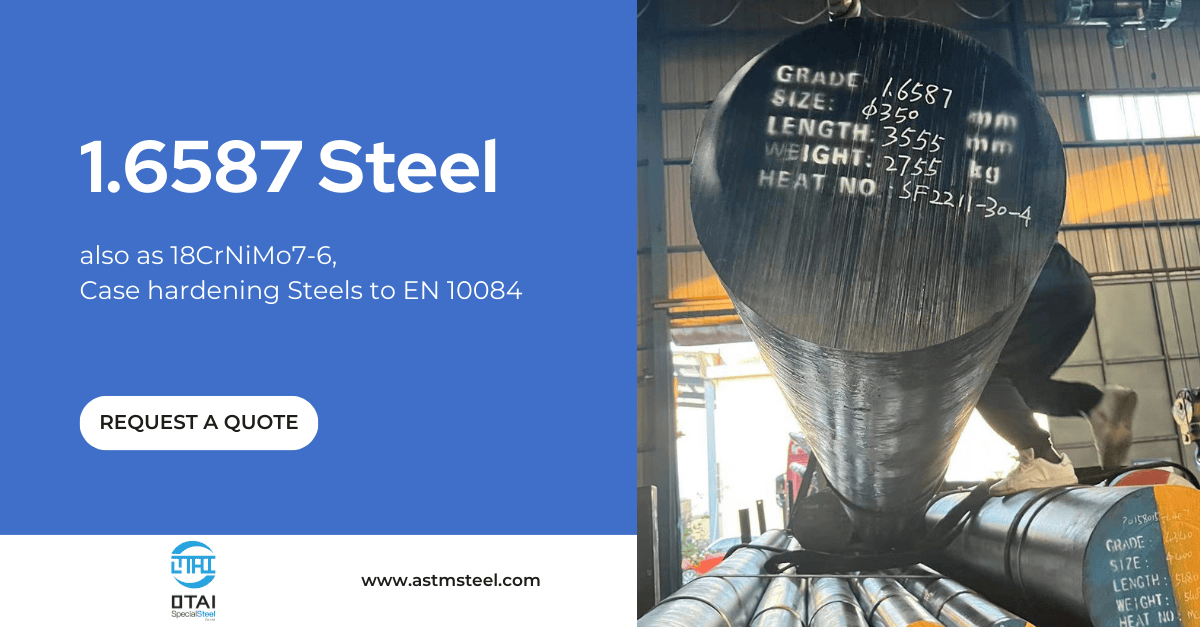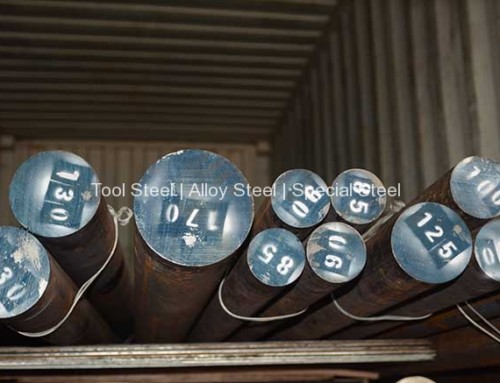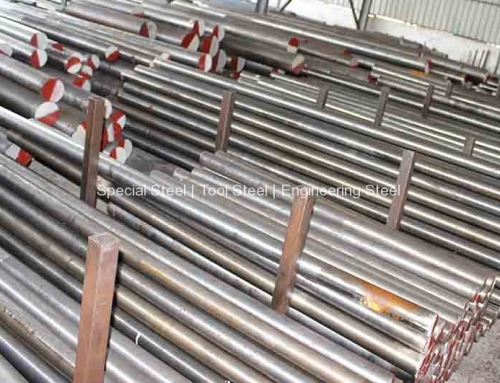Brief Introduction to 1.6587
DIN 1.6587 steel, sometimes referred to as 17CrNiMo6 steel (the old steel number, while the new steel grade in updated standard version EN 10084 is 18CrNimo7-6), is a case-hardening alloy. It’s widely needed for its dynamic strength, especially in industries where high surface hardness is needed. The 1.6582 chemical composition offers numerous benefits, from durability to resistance against wear and tear.

Supply Range of Steel Material 1.6587
Round Bar: diameter 20mm – 500mm (*stock material up to dia 300mm, check with us for stock list)
Surface Finish: Black Surface, Milled Surface or Polished Surface as per given requirements.
1.6587 (18CrNiMo7-6) Equivalent Steel Grades
As the casing hardening steel, 1.6587 grade is equivalent to:
- DIN 17210 17CrNiMo6
- AFNOR 18NCD6
- UNE 14NiCrMo13
Chemical Composition: What Makes Up 1.6587 Alloy Steel?
1.6587 material has the chemical composition below per EN 10084 standard:
- Carbon (C): 0.15 – 0.21%
- Manganese (Mn): 0.50 – 0.90%
- Silicon (Si): 0.40%
- Chromium (Cr): 1.50 – 1.80%
- Nickel (Ni): 1.40 – 1.70%
- Molybdenum (Mo): 0.25 – 0.35%
Why DIN 6587 Steel Stands Out
- Versatility: It’s applicable in numerous industries, from automotive to aerospace.
- Durability: Resistant to wear and tear, it’s designed for the long haul.
- Machinability: Despite its strength, it’s relatively easy to work with.
Applications: Where Can You Use 1.6587 Steels?
Due to its properties, DIN 1.6587 grade steel is used for strong and hard parts. It’s good for big parts that wear out quickly and carry heavy loads. This includes parts like big bushings, bearings, cam parts, clutch pieces, bolts for compressors, fan rods, heavy gears, pump rods, sprockets, tappets, wear pins, and wire guides.
Comparing 1.6587 Alloy Steel With Other Alloys
When pitted against other materials, 1.6587 steels often emerge as a top contender. It offers a balance between hardness and toughness, something that not every alloy can promise.
Heat Treatment of 6587 Steel
- Soft Annealing: Heat 6587 steel to 650-700oC, cool slowly in furnace. After annealing, it achieves max hardness of 229.
- Normalizing: 850-880oC, air.
- Hardening: Carburising: 880-980oC. Core Hardening: 830-870oC, water. Case Hardening: 780-820oC, water.
- Tempering:Temperature: 150-200oC
Processing 1.6587 Alloy Steel: What You Need to Know
Whether you’re looking to weld, form, or cut this steel, understanding its behavior under various conditions is vital. Fortunately, with the right techniques, working with 1.6587 is a breeze.
Conclusion
1.6587, with its myriad of features, stands as a testament to the power of specialized alloys. In a world constantly pushing the boundaries of engineering and design, materials like these will inevitably lead the charge.
For those who want to check more properties or best on sale price of 1.6582 steels or have any inquiries or order to place, don’t hesitate to email jeremy@otaisteel.com or reach out via WhatsApp at +8613610149979. Otai is one of leading supplier of 1.6582 / 18CrNiMo7-6 supplier for you.
Our Customers





FAQs:
- Is grade 1.6587 suitable for high-temperature applications? While 1.6587 steel is durable, it’s essential to ensure its properties align with specific high-temperature needs.
- How does 1.6587 alloy steel compare to stainless steel? 1.6587 is a case-hardening alloy, whereas stainless steel is known for its corrosion resistance. Their applications differ based on these properties. When you are not sure how to choose the right steel grades, you can contact us anytime.
- Where can I purchase 1.6587 material ? Contact Dongguan Otai Special Steel for all your steel needs.
- Can steel material 1.6587 be used outdoors? Given its properties, it’s suitable for various environments, including outdoors, but always consider protective measures against prolonged exposure to adverse conditions.
- What industries typically utilize 1.6587 material? Industries ranging from automotive to aerospace frequently use this alloy, especially in components requiring strength and durability.




